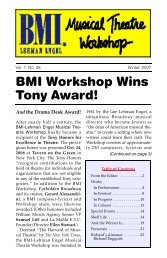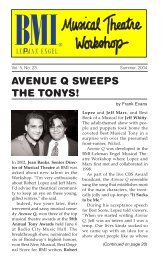You also want an ePaper? Increase the reach of your titles
YUMPU automatically turns print PDFs into web optimized ePapers that Google loves.
My Grandfather Knew<br />
Franz Kline<br />
“Look at this bathrobe,” Beverly said. “Just look at<br />
it.” She pulled the bathrobe from a tangle of clothing<br />
crammed into one of those big, black, industrial plastic<br />
trash bags. “I gave him this for Christmas last<br />
year, and now look at it. No respect, Marty. The dead<br />
get no respect.”<br />
I made some sort of sympathetic masculine<br />
sound from the doorway and wheeled the white canvas<br />
laundry hamper into position for loading. I didn’t<br />
shut the door. We wouldn’t be long. Rooms in which<br />
people have recently died give me the willies, and<br />
rooms in nursing homes are always rooms in which<br />
someone has recently died.<br />
It had begun the way these things always<br />
began, with a phone call that had Beverly on the<br />
other end, crying. The pattern had been the same for<br />
25, 27 years. She called, crying, and I came. The<br />
first time she was 18. I was... older. I still was, but<br />
her grandfather was not.<br />
The following Saturday I was on a train to Philadelphia,<br />
pulling into 30th Street Station past those stone<br />
slabs so blackened by rail traffic that no power on<br />
earth could get them clean.<br />
Beverly was waiting. We drove to the low, flat<br />
<strong>com</strong>plex somewhere out in the suburbs, heaven only<br />
knows where, because no one ever really knows<br />
Philadelphia. The talk with the bureaucrats ensued,<br />
followed by the <strong>com</strong>mandeering of the white canvas<br />
laundry hamper and the arrival at the room where<br />
Beverly was now glaring at a dead man’s bathrobe.<br />
She was not a bad-looking woman at 45,<br />
weight still right at the old welterweight limit. But the<br />
roots of her hair were gray, and she hadn’t bothered<br />
to touch them up.<br />
“What else is your grandfather’s? Was your<br />
grandfather’s?” I asked.<br />
“The clothes in these bags. The Franz Kline<br />
print on the wall. The TV.”<br />
The TV was a big portable in the corner opposite the<br />
bed; it was secured with a serious chain and padlock.<br />
“You’ll need the key,” she said, as I examined it.<br />
“What for?” I got a grip on the TV, lifted it and<br />
set it on the bed as the chain and padlock hit the<br />
floor in three pieces.<br />
“Bastards,” she said. “Cut one link, and no one<br />
will notice until after the TV walks out the employees’<br />
entrance. They didn’t like me here.”<br />
“Why not?”<br />
“It takes an old RN to call out another RN. I<br />
know what’s supposed to be happening on the floor<br />
and how it’s supposed to be done. And I wasn’t shy<br />
about saying so.”<br />
Prize-Winning Short Story by Jerry James<br />
“Maybe you should have talked to them like a<br />
colleague.”<br />
“He was my grandfather. They were in<strong>com</strong>petent.<br />
I don’t have in<strong>com</strong>petent colleagues. You learn<br />
that on the floor.”<br />
“When you write your autobiography you can<br />
call it Up From the Floor.” I picked up one of the big<br />
black plastic trash bags and dropped it into the hamper.<br />
The bag was heavy. “You don’t get that, do<br />
you?”<br />
“Get what?”<br />
“Booker T. Washington called his autobiography<br />
Up From Slavery.”<br />
“You know entirely too much irrelevant stuff,<br />
Marty.”<br />
“I guess.” I looked at the print on the wall. “Not<br />
to criticize your taste or anything, but why, for someone<br />
confined to bed, would you choose a Franz<br />
Kline?”<br />
“What makes you think I chose it?”<br />
“Well, very few farmers are into abstract<br />
expressionism.”<br />
“My grandfather and Franz Kline grew up<br />
together near Wilkes-Barre. Hard coal country boys.”<br />
Beverly sat on the bed and looked at the print.<br />
The Kline was wide strokes of black diagonals<br />
on white, as clean and hard as a punch to the face<br />
of Jackson Pollock delivered in the Cedar Bar.<br />
“Your grandfather had good taste.”<br />
“He must have. He raised me, didn’t he? Him<br />
and my grandmother, whatever raising there was.<br />
My mother, well, my mother liked men.”<br />
“So do you. You like me.”<br />
“Yes. But my mother liked the kind of men<br />
who’d pour a pint of Southern Comfort down the<br />
throat of her 15-year-old daughter and afterwards<br />
say he couldn’t figure out what was wrong with that<br />
girl of hers, crying in her room all the time.”<br />
“Am I reading you right?”<br />
“Lost it at 15 to Southern Comfort and my<br />
mother’s boyfriend.”<br />
“You never told me that.”<br />
“Why should I?” I didn’t have an answer, so I<br />
grabbed another black plastic trash bag and slung it<br />
into the hamper.<br />
“After that I moved in with my grandfather and<br />
grandmother, and that’s why I’m a hospital administrator<br />
today instead of a truck stop whore.”<br />
“You had something to do with that,” I said.<br />
Beverly didn’t answer. Instead she got up from the<br />
bed and picked up another black trash bag. The bag<br />
split cleanly, right across the bottom seam. There<br />
had been a lot of clothes in the bag.<br />
“Shit,” she said. “Shit, shit, shit.” Then she fell<br />
to her knees on the old man’s clothes and began to<br />
cry.<br />
“Hey, it’s OK,” I said. I leaned over, hugged<br />
her. “It’s OK.”<br />
“I know it’s OK. But it’s not OK, OK?”<br />
“You sound like a Valley Girl,” I said.<br />
Beverly reached into the pocket of her jeans,<br />
pulled out a tissue, wiped her eyes, blew her nose.<br />
“Close the door,” she said. I did. “Does it<br />
lock?”<br />
“No.”<br />
“No matter. Now sit here on the floor with me.<br />
I’m going to tell you a story.” She pulled herself into<br />
a cross-legged stance on the pile of her grandfather’s<br />
clothes.<br />
“Do I have to sit like that? My knees won’t take<br />
it.”<br />
“Sit however you want. But don’t interrupt.”<br />
“OK.” Beverly looked at me. I put a finger to<br />
my lips.<br />
“When my grandparents moved into this place<br />
maybe ten years ago they had their own apartment.<br />
But they got older and less mobile, and they finally<br />
ended up here, the nursing home wing. They weren’t<br />
stupid people. They knew the nursing home wing<br />
was the end of the line.<br />
“My grandmother died first, a little over three<br />
years ago. They’d been married for 62 years. This<br />
room became my grandfather’s world. I bought him<br />
the TV for the Phillies and the Eagles and the Nittany<br />
Lions. And when I asked him if he wanted anything<br />
on the walls, he said he wanted a print by<br />
Franz Kline.<br />
“They were hardscrabble German boys, he<br />
told me, always in fistfights with the Irish or the Italians.<br />
Then he went west and became a farmer, and<br />
Franz Kline went east and became a painter. Kline<br />
died of a heart attack about forty years ago. He didn’t<br />
kill himself like most of the abstract expressionists<br />
did.”<br />
“Maybe he just did it in a different way,” I said.<br />
Beverly looked at me again. I shut up. She went on.<br />
“’I like that painting,’ my grandfather said. ‘It<br />
looks like the old days in Wilkes-Barre in the winter,<br />
all black forms in the white of the snow.’”<br />
I wondered if the stone slabs at 30th Street<br />
Station would look that black in the snow.<br />
“I found a quote for him. Franz Kline said, ‘You<br />
paint the way you have to in order to give. Someone<br />
will look and say it’s the product of knowing, but it<br />
has nothing to do with knowing, it has to do with giving.’”<br />
“You memorized that?”<br />
“Want to look it up?” I was silent. “Remember<br />
that quote, that it has nothing to do with knowing, it<br />
has to do with giving.<br />
“My grandfather was dying. He was dying and<br />
suffering. And I came in here every evening after<br />
work, and I sat in that chair beside the bed, watching<br />
him die, watching him suffer.<br />
“And I looked at the Franz Kline print, and I<br />
thought about the knowing it has nothing to do with<br />
and the giving that it does.<br />
“A week ago yesterday, Friday, I went in to<br />
work, and I made a few adjustments, adjustments<br />
that only someone with the powers of an administrator<br />
and the knowledge of an RN who’d <strong>com</strong>e up from<br />
the floor would know how to make. And when I came<br />
back into this room on Saturday morning I was carrying<br />
morphine and a syringe.”<br />
My stomach began to contract.<br />
“They’d never detect it. No one would ever<br />
detect it. They wouldn’t even think to look for it. All it<br />
would be was another old man finally dying.<br />
“I sat in that chair beside the bed, and I asked<br />
his forgiveness for what I was about to do. I told him<br />
it had nothing to do with knowing, it had to do with<br />
giving. And then I injected him with the morphine.<br />
“I drove home, and I sat by the phone, and I<br />
waited for it to ring. And I waited and I waited and I<br />
waited, until the sun had gone down and the room<br />
was dark.<br />
“After I’d been waiting for ten hours I called the<br />
nurses’ station. I asked if I’d left a book on the table<br />
beside the bed. When they told me I hadn’t, which I<br />
already knew, I casually asked how my grandfather<br />
was.<br />
“My grandfather, I was informed, was fine. Just fine.<br />
Five days later, he died.”<br />
“Not about the knowing,” I said, “but about the<br />
giving.”<br />
“Yes,” she said. “You know what grace is,<br />
Marty?”<br />
“You mean theologically?” She nodded. “Sort<br />
of.”<br />
“It’s an unearned gift from God. That’s the last<br />
thing my grandfather gave me. Grace.”<br />
“I didn’t think the story was going to end that<br />
way.”<br />
“Neither did I. Would you put the other bags of<br />
clothing in the hamper, please?”<br />
I got up and put them in, black bags against<br />
white canvas. Beverly leaned over from where she<br />
sat cross-legged on the floor and picked up a rubber<br />
doorstop. She handed it to me.<br />
“Put the TV in on top of the clothes,” she said.<br />
“Then stick this under the door. Leave the Franz<br />
Kline for now. I want it to be the witness.”<br />
She took her grandfather’s clothes from the floor,<br />
piece by piece, and began covering the bed with<br />
them. I put the TV in the hamper, then bent down to<br />
jam the doorstop under the front door.<br />
When I turned back she was unzipping her<br />
jeans.<br />
“The Plains Indians burned sage as a purification<br />
ritual. I have my own ideas.”<br />
“Beverly, they can force that door if they want<br />
to.”<br />
“Let them.”<br />
“A man died in that bed.”<br />
“And now we’re going to make love in it. On<br />
his clothes.”<br />
“I don’t know if I can do that,” I said.<br />
“It isn’t the knowing,” she said. “It’s the giving.”<br />
42<br />
43














